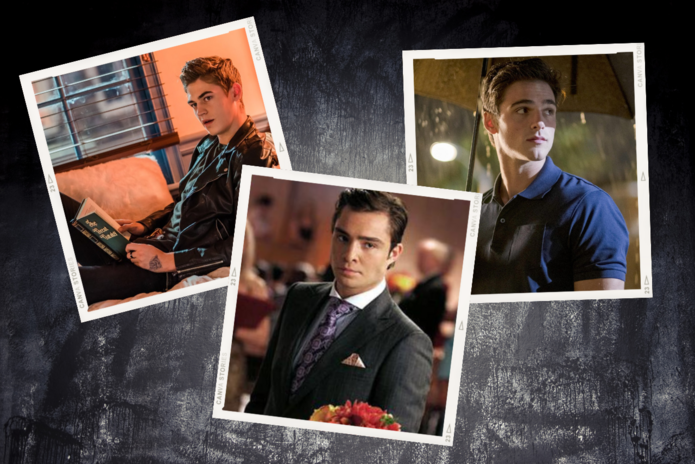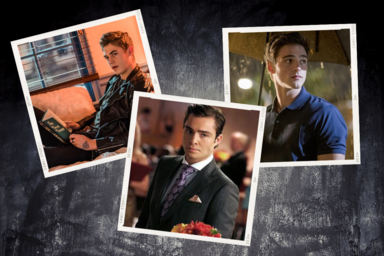When I need a break from using too much brain power, I often find myself in need of a good cringe-watch. But as I dove into the After films, who knew this silly little series would send me down a rabbit hole of one of media’s most toxic tropes: the bad boy trope?
I had low expectations going into the After series (after all, awful reviews made good cringe a guarantee, and it’s not like these movies did well critically). The expected cringe didn’t disappoint, but I do have one overarching gripe: the main love interest, Hardin, is absolutely unlikable at best. He’s rude, selfish, and totally disregards protagonist Tessa’s boundaries. I kept asking myself how I was expected to believe these two characters were destined for each other when he was so horrible to her.
This characterization is fairly outdated – or at least, it should be. Hardin fits the description of a traditional “bad boy,” or the tall, dark and handsome rulebreaker who can only be tamed by the right girl, but he takes it a step farther by being possessive, manipulative and selfish. This toxic trope does more harm than good, and I’ll be happy to never see a bad boy in new media again – post my After marathon, of course (obviously I have to see it through). The bad boy has aged extremely poorly, and it would be for everyone’s benefit if we just phased him out of pop culture.
What Exactly Is A Bad Boy?
So, you’re watching TV and you’ve spotted him: the conventionally to outrageously attractive man who believes he’s simply misunderstood. But there’s a lot more to him than that.
1. He Has A Toxic – Or Even Dangerous – Personality
Moody and broody, the bad boy takes having a bit of spunk a little too far. I love a feisty underdog as much as the next person, but the bad boy is straight-up arrogant. He has a dark outlook on life, and he’s usually pretty egotistical and self-destructive. Look at J.D. from Heathers, who at first is framed as a sarcastic and charming outsider, albeit with some darker tendencies. He offers main character Veronica a chance to escape from her cookie-cutter life, but he’s revealed to be a sociopathic killer who threatens her safety multiple times. Or look at Nate, from Euphoria, who is a horrifying representation of your everyday Brock Turner type, dripping in privilege. He’s abusive, manipulative, and an excellent liar, hiding behind his good looks and his family’s reputation to stay out of trouble.
The bad boy’s behavior is often justified with a tragic backstory. It commonly involves said bad boy having a strained relationship with his father, like Barney from How I Met Your Mother or Jess from Gilmore Girls. But rather than being a moment for growth, the tragic backstory just serves to excuse the bad boy’s harmful actions.
However, it gets even more sticky. This toxic personality is framed as intriguing, and sometimes even romantic.
2. He’s A Romantic Lead, But Disregards Boundaries Or Consent
The bad boy’s angsty, edgy appeal makes him prime love interest material, but he has to get what he wants when he wants. The bad boy’s relentless pursuit of the girl he’s after is viewed as romantic when it’s actually just creepy. At times it may even be abusive. He’s possessive, doesn’t take no for an answer, and he doesn’t feel any remorse or face any consequences. He feels completely and utterly entitled to the girl’s affection. In fact, this behavior is just framed as “fighting for the girl.”
Chuck and Blair from Gossip Girl are one of the most popular couples in teen drama history, but I can’t think of a pair less deserving of that pedestal than these two. The famously sinister Chuck emotionally manipulates Blair for the entire series, cheats, and at times there’s even physical violence. He’s awful to her, yet he stakes a claim on her and can’t stand to see her with other boyfriends. Plus, his assaults on other female characters go totally unchecked. This 2000s’ teen heartthrob is a shameless abuser.
How does the bad boy get away with it? Apart from the sob story (Chuck has a missing mother and a terrible father), the bad boy is exceptionally handsome. When “unattractive” men behave this way with women, they’re rightly villainized thanks to incel culture, which exposes men who view women just like these bad boys do. Since they aren’t conventionally attractive, it’s apparently easier to see clearly (I guess good-looking guys are above the law?). The bad boy may be a jerk, but he’s just so cute.
3. Any Character Development Comes At The Expense Of Women
The bad boy is a pretty heteronormative trope; it actually almost depends on being a heteronormative trope. Because not only is the bad boy always paired with a girl, that girl becomes a commodity in his character arc. If he betters himself, it usually comes at the cost of her time, energy, and well-being.
In fact, the bad boy isn’t paired with any girl: he’s paired with the good girl, AKA the girl next door. The picture perfect girl next door takes it upon herself to try and “fix” this bad boy, but he hurts her multiple times along the way and often just ends up taking her down with him.
Sandy and Danny from Grease are a classic example of the bad boy/good girl dynamic. Sandy’s a romantic at heart while Danny’s in a greaser gang, but they have a summer fling while on vacation. After publicly humiliating her and committing borderline assault, it’s actually Sandy who changes herself to be with him. Instead of facing the consequences of his actions, Danny gets to have his cake and eat it, too.
What’s So Bad About A Bad Boy?
They say life imitates art, and in this instance, that’s not really a good thing. The bad boy’s consequences reach much further than just cheesy entertainment.
1. Boys & Men Think This Is The Right Way To Act
Framing the bad boy as cool, or as an object of desire, sends all the wrong messages to the young men and women watching. No good can come out of romanticizing an emotionally unavailable guy who disrespects women. Men already avoid therapy as it is, and idealizing these depictions of guys with unhealthy relationships with their emotions probably doesn’t help convince anyone to try.
And of course, an unchecked negative relationship with your emotions often festers beyond just you. The bad boy routinely hurts the women in his life, most of whom just want to help him. That’s actually harmful too, as men tend to over rely on the emotional labor of women rather than put in the work themselves. The bad boy teaches men that this behavior is acceptable; that this is what women want.
Miami-based sex and relationships therapist Dr. Carolina Pataky, LMFT, CST tells Her Campus that “possessiveness being highlighted as hot and romantic [is absolutely a red flag]. Jealousy and controlling behaviors do not equate to love.” Pataky reminds us that boundaries and communication are what’s hot and romantic. “But that’s not what’s being sold on TV.”
Toxic masculinity is dangerous, and idealizing aggressive and misogynistic male characters only further perpetuates this toxicity. What good comes out of teaching boys to suppress their emotions into anger, or to disrespect women? It leads to men both harming themselves and harming others. TV isn’t real life – what may make for an intriguing character can easily translate into an awful human being IRL.
Related: 5 Signs You’re In An Unhealthy Relationship
2. Girls & Women Are Taught To Accept This Kind Of Behavior From Men
Were you ever told when you were little that a boy was being mean to you because he liked you? That was your elders teaching you right from the start that it’s okay for a guy to mistreat you so long as he has feelings for you, and that only gets more reinforced when you turn on the TV and watch Blair take back Chuck on Gossip Girl after he literally sold her to his uncle to regain his hotel (no, I’m not making that up). The bad boy trope tells girls to stay with abusive guys because, hey! You’ve got a boyfriend who says he loves you.
For many, the worst thing a woman can be is single, and this can lead to women wanting to find a man by any means necessary. So, women stay with men who don’t deserve them, or waste precious time and emotions trying to fix him. But women don’t exist to be men’s therapists, nor are we props in order for men to find themselves.
Fiction isn’t real life, no matter how many stories tell you that it’s going to work. Anastasia marrying Christian – a man who doesn’t respect safe words or personal boundaries – in the Fifty Shades series serves as nothing more than wish fulfillment for real women. Glorifying this kind of man prevents women from telling apart fictional bad boys from real life abusers.
The Bad Boy & Alt Subcultures
With Olivia Rodrigo’s breakout success and pop punk making a general comeback, there’s been a bit of a bad boy renaissance as of late. And this is fine; I too love edgy tall guys with guitars and tattoos.
However, the reason this is all okay is because it’s just that: an aesthetic. In other words, you can be a bad boy without being a bad guy. Machine Gun Kelly is outspoken about his love for girlfriend Megan Fox (borderline TMI at times), and YUNGBLUD doesn’t shy away from challenging traditional gender roles. Having rebellious appeal doesn’t have to translate to being mean or abusive, and these celebrities have proven it.
That being said, we’ve also been seeing the rise of the nice boy (not to be confused with the nice guy). Joshua Bassett is a certified sweetheart, and Jake Peralta from Brooklyn 99 and Jason Mendoza from The Good Place represent a more gentle TV heartthrob. Even “himbos” are having their well deserved moment in the sun. Dr. Pataky has also noticed movie and TV couples trending towards being much more supportive of each other. “I think there’s been a shift from individuals feeling threatened by one another’s growth to being encouraging and positive about one another’s new career venture, picking up a new hobby, etc.,” she says.
And may this shift continue. It’s clearly possible to make a man desirable without making him toxic or misogynistic, even if he’s a little rough around the edges. The antiquated bad boy can stay in the past where he belongs, while the nice boy takes his rightful reign.
Expert sources:


